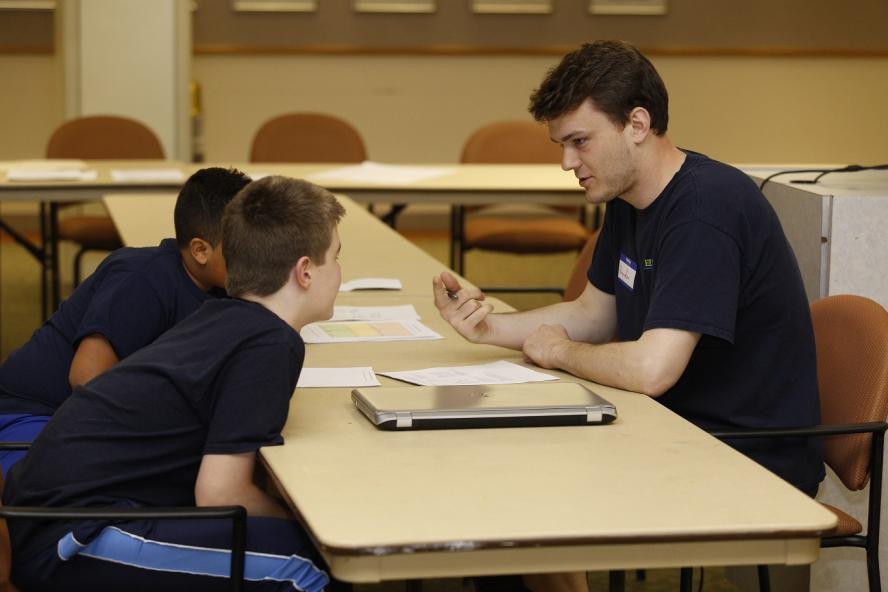-
About
- Departments & Offices
-
Academics
- Physician Assistant
- Special Master’s (MBS)
-
Admissions & Financial Aid
- Tuition & Fees
-
Student Life
-
Research
- Research Labs & Centers
-
Local & Global Engagement
- Global Health Program
A Life of Its Own for Community Service Learning
A donor-created endowment adds strength and possibilities to the CSL program at Tufts School of Medicine

By Kris Willcox
Every Tufts medical student strives to attain the skills of a great physician, beginning with diagnostic and clinical abilities, critical reasoning, and problem solving. Outstanding care also requires communication, empathy, and learning from others’ experience. Through the Community Service Learning (CSL) program—a partnership between the medical school and Tufts’ Tisch College of Civic Life—first and second-year students cultivate these skills while building partnerships with organizations across Boston.
Josh and Hollis Young know the impact of the CSL Program first-hand, and recently helped to establish an endowment to support it in perpetuity. Josh, who served as a senior gift officer at the medical school before his 2016 retirement, recalls the connections he witnessed between Tufts students and residents in a nursing-care facility, as they created family scrapbooks. “It was so moving for the students to help put the scrapbooks together, and walk through those memories and experiences with the residents.” He believes such interactions, in retirement communities, cultural centers, or neighborhood clinics, are a vital complement to clinical training. Hollis, a retired attorney, agrees: “My hope is that Tufts students will look back on the CSL experience as a formative part of their training.”
“Population health is one of the primary threads of our curriculum,” says Scott Epstein, MD, Dean for Educational Affairs. Though it does not involve clinical care, the CSL requirement introduces students to fundamentals like social determinants of health and health inequalities, and teaches advocacy, which physicians need “whether they are speaking to patients, community members, other health care providers, or even institutions like the government.” Finally, he says, CSL embodies the “active citizenship” that is valued across Tufts.
For CSL Program Coordinator Jennifer Greer-Morrissey, the learning in “service learning” starts with educating students in “an asset-based approach [that treats] the community, not as … problems that need to be fixed,” but “a place with its own strengths, programs, resources, and assets they can work with, and learn from.” For many students, CSL is a feature that attracted them to Tufts and “reminds them why they’re here.” Yet not all service learning lessons are easy, observes Epstein. “One of the hardest lessons in medical school, and in life, is that change requires patience.” Whether joining an existing project, like Sharewood, or launching a new initiative, students learn to cultivate patience and perseverance, “yet maintain their energy level, as they seek to make change.”
CSL can help students to see with new eyes. Greer-Morrissey offers an example from the Boston Health Care for the Homeless Program’s Foot Care Clinic, where a Tufts student struggled to help a client coping with recurrent “trench foot.” Through conversation, the student learned that the client wasn’t removing his shoes at night, for fear of having them stolen. Addressing his health concern meant understanding his daily experience.
To the Youngs, an endowed fund was a way to support an existing program they love, and give it “a life of its own” by providing continuing funds to support student projects. Another person to take up that opportunity was Dolores Emspak, MD, M79, a retired OB/GYN who credits Tufts for leading her to a fulfilling career. As a clinician and educator, Dr. Emspak knows the importance of allowing each patient to “tell her story.” “Patients don't come to you like they do in the textbook. You can have a tremendous amount of knowledge in your head, but if you can't figure out the patient, you're going to miss the mark.” CSL nurtures this attentiveness, she says. “It’s something I feel very proud to contribute to.”
The CSL endowment will strengthen the program at many levels, from budgeting and planning, to engaging more participants. An expanding program may even include pathways for third and fourth year students, such as an elective clinical rotation in homeless health care. “We're empowering students as leaders,” says Greer-Morrissey, “to partner with communities and with their classmates, to create new things that other students can pick up, or work with an existing project and take really good care of it.” Most exciting is the chance to help students test innovative ideas. “Many student-founded projects, like Sharewood, have become iconic parts of the Tufts experience.”
Perhaps the most far-reaching impact of the endowment is building on CSL successes. “We've tried to take a scholarly approach to community service learning,” says Dean Epstein, “so we can share our findings and maybe inspire other institutions.” Through the generosity of alumni and friends, and a growing endowment, the CSL program will continue to provide opportunities for learning, and building healthy communities, at Tufts and beyond.